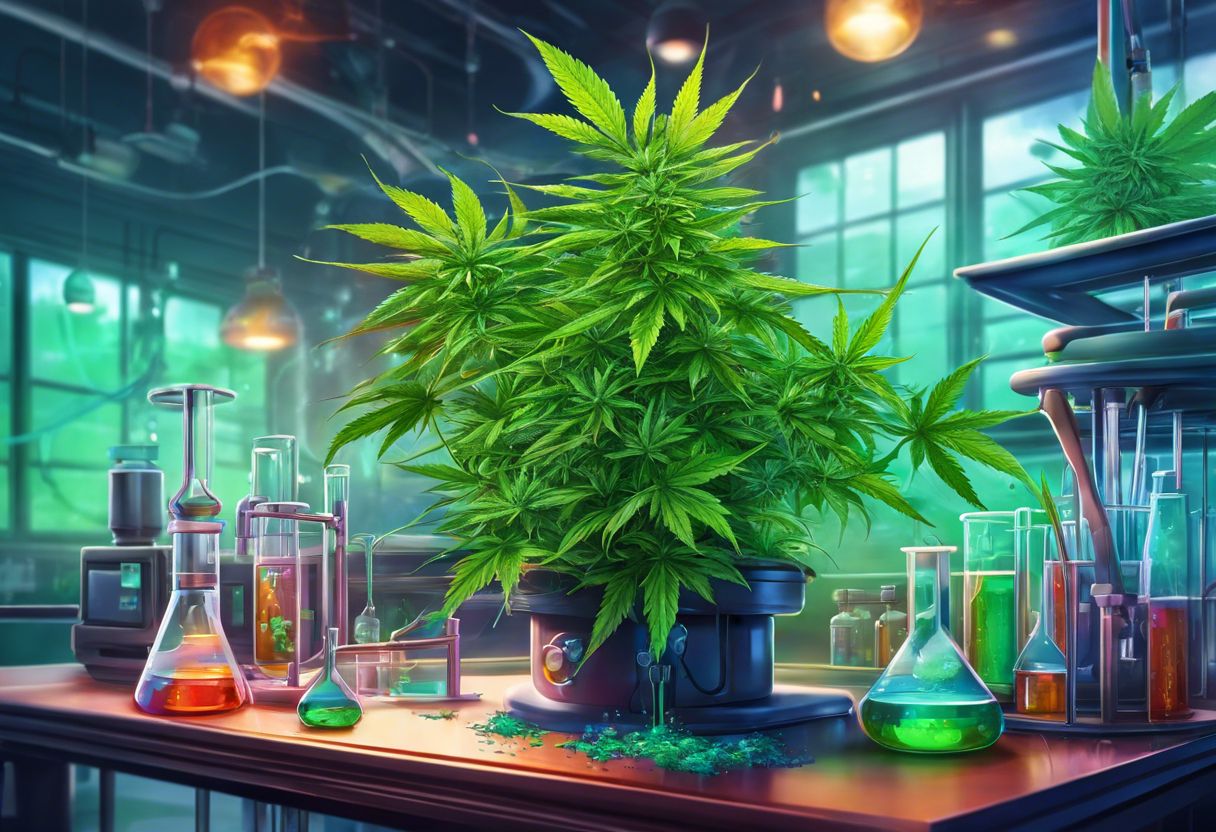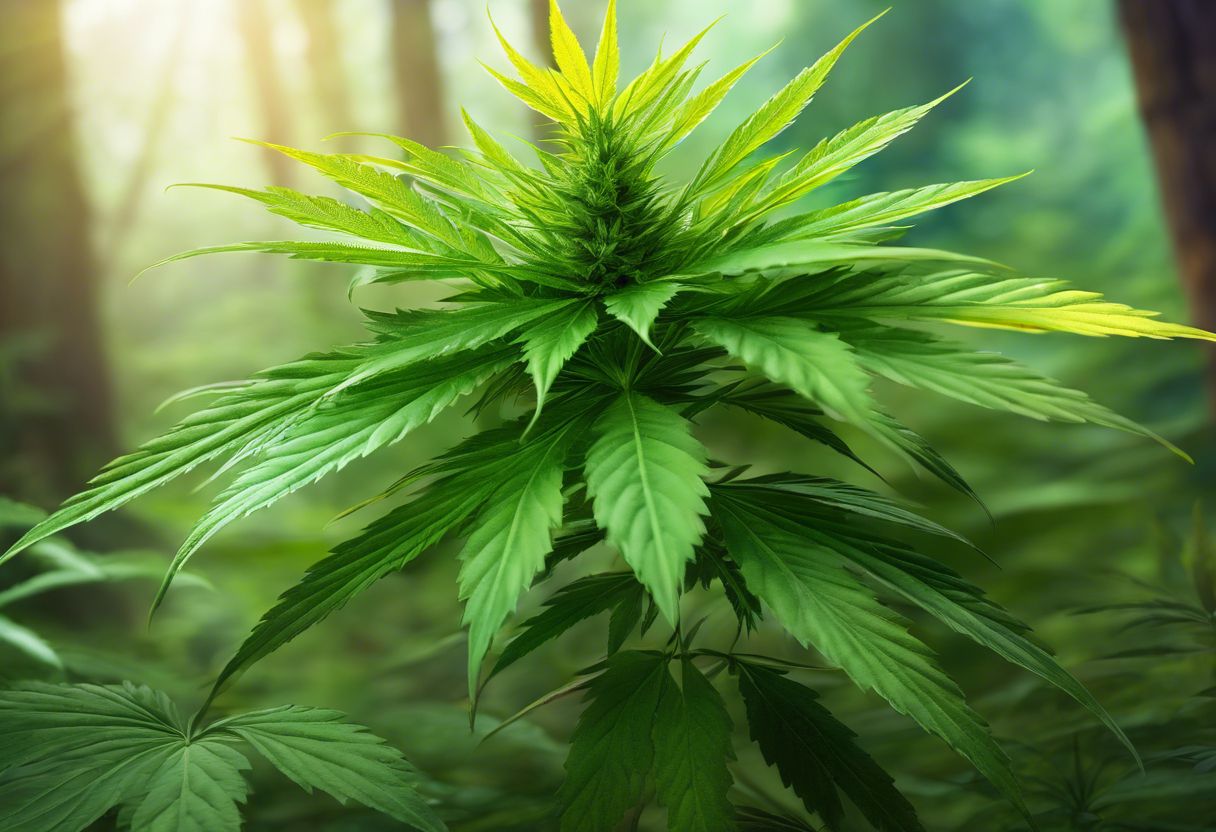You’re curious about Delta-8 THC and wondering if it’s a synthetic compound, right? Well, Delta-8 is a lesser-known cousin of the infamous Delta-9 THC found in cannabis plants. This article will clear up any confusion you have about whether Delta-8 is all lab-made or nature-born.
Keep reading to get the lowdown on what really goes into those gummies and vapes!
Key Takeaways
- Delta – 8 THC is mostly made in labs from CBD. Even though it starts as part of the hemp plant, there’s not enough naturally, so scientists make more.
- Using delta – 8 can make you feel a bit high but it’s less strong than regular THC. Still, be careful because too much can give bad effects like dizziness or dry mouth.
- Some states don’t allow delta – 8 because they worry about health risks and how people might act when they use it. Always check your local laws before getting any.
- Watch out for bad chemicals that could be in delta – 8 products. Always buy from places that show their stuff is clean and safe with lab tests.
- Keep delta – 8 away from kids and pets to keep them safe. Store them where little ones and animals can’t get to them at all times.
Understanding Delta-8 THC

Delta-8 THC is a cannabinoid found in cannabis, but unlike Delta-9 THC, it has a milder psychoactive effect. It interacts with the body’s endocannabinoid system to produce its effects.
What Is Delta-8?
Delta-8 THC is like the chill cousin of the famous THC you’ve heard about. It comes from the hemp plant, and it’s got some feel-good vibes. People call it “marijuana lite” because it’s not as strong.
Think of it as diet weed that still gets your spirits up but won’t knock you flat. This stuff is mostly made in a lab where they turn CBD into delta-8, so even though it starts off natural, there’s some science magic involved to make more of it.
It’s important to know that while delta-8 hangs out in cannabis plants, there isn’t much of it just lying around. So if you see gummies or oils with lots of delta-8, that means someone has been busy in a lab making a version based on what nature started.
This doesn’t mean it’s fake—it’s just been helped along by people who know their chemistry.
How Delta-8 THC Differs From Other Cannabinoids
You’ve heard about Delta-8 THC, but it’s not the same as other parts of the hemp plant you might know. Let’s break down how Delta-8 stands out from its relatives:
- It’s called “diet weed” for a reason. Delta – 8 gives you a lighter feeling than the usual THC, which means less intense effects.
- Unlike CBD, Delta – 8 can make you feel a bit high. CBD is more about calming you down without that buzz.
- In the big cannabis family, Delta – 8 is like the rare cousin. It shows up in tiny amounts in hemp plants.
- Scientists can take CBD and change it into Delta-8 in labs. That makes some Delta-8 stuff you find kind of man-made.
The Effects of Delta-8 THC on the Body

Delta-8 THC can have psychoactive and intoxicating effects on the body, similar to Delta-9 THC. It’s important to be aware of potential risks and side effects associated with its consumption.
Psychoactive and Intoxicating Effects
Delta-8 THC packs a punch but it’s not quite as strong as its cousin, delta-9 THC. People call it “diet weed” or “marijuana lite” because you can feel high, just more chilled out and clear-headed.
It works on your brain to change how you feel and think. This is the psychoactive part – making music seem sweeter or food taste better.
But be careful, too much might make you feel dizzy or sleepy and some folks get dry eyes or mouth. If you’re new to this, start slow with edibles like candies or cookies. Remember that these treats take time to kick in, so give them a couple of hours before taking more.
Just enjoy the vibes and stay safe!
Potential Risks and Side Effects
Using products containing delta-8 THC may pose potential risks and side effects. While it’s touted as “marijuana lite,” the man-made nature of many delta-8 products raises concerns about impurities from synthetic processes.
These impurities, particularly in edibles like gummies, could have adverse effects on your health, especially when consumed in concentrated amounts. Moreover, the chemical synthesis of delta-8 THC from CBD and hemp may result in uncontrolled or unsanitary settings, leading to further safety hazards for consumers.
Additionally, some companies use potentially harmful chemicals during the production of delta-8 products, raising worries about consumer safety. When shopping online for cannabis-related items such as edibles or vape cartridges containing delta-8 THC, it’s crucial to be aware of these potential risks and side effects due to their synthetic nature and the possibility of impurities stemming from their production process.
The Legality of Delta-8 THC
Delta-8 THC occupies a hazy legal space. The 2018 Farm Bill legalized hemp-derived cannabinoids, including Delta-8, with a condition that the final product contains no more than 0.3% Delta-9 THC.
However, some states have explicitly prohibited or restricted Delta-8 THC and its products due to concerns over potential health risks and psychoactive effects. Despite its federal legality, it’s crucial to check your local regulations before purchasing Delta-8 products.
Several ongoing discussions on the legal status of Delta-8 bring uncertainty for consumers unaware of these developments. As you shop for Delta-8 products, it’s essential to stay updated on changing laws in your state regarding this cannabinoid to avoid any unintended legal consequences related to possession or consumption.
Concerns Regarding Delta-8 THC
As the popularity of Delta-8 THC grows, there are concerns about the use of potentially harmful chemicals in its production and adverse event reports involving Delta-8 THC products.
These concerns have raised questions about the safety and legality of using Delta-8 THC, prompting a closer look at its potential risks and side effects.
Use of Potentially Harmful Chemicals
Some companies use potentially harmful chemicals when making delta-8 products. This can be concerning because these chemicals may not be safe for consumption. Chemists worry about impurities that could form during the production process, especially in products like gummies.
It’s essential to choose reputable brands that prioritize safety and quality in their manufacturing processes, using transparent and reliable methods to create delta-8 products.
By selecting trustworthy brands that provide lab-tested and certified products, you can ensure the purity and safety of the delta-8 THC you consume. Look for certificates of analysis and high-quality standards to make informed decisions as a cannabis consumer shopping online while prioritizing your health and well-being.
Adverse Event Reports Involving Delta-8 THC Products
Adverse event reports about delta-8 THC products have raised concerns about potential risks and side effects. These reports suggest that some users experienced adverse reactions after consuming delta-8 THC, including dizziness, nausea, and fatigue.
It’s important to note that concentrated amounts of delta-8 can be synthetically created from CBD and hemp in a lab, raising questions about the purity and safety of these products.
Reports also indicate concerns about impurities formed during the synthesis of delta-8 THC, particularly in products like gummies. This has led to increased scrutiny regarding the manufacturing processes and quality control standards within the industry.
As a cannabis consumer shopping online, it’s crucial to stay informed about these adverse event reports to make educated decisions when considering delta-8 THC products for purchase.
Is Delta-8 THC Considered a Narcotic?
Delta-8 THC is not classified as a narcotic, but its legal status varies. It’s vital to understand the laws in your area before buying or using delta-8 products. Some states explicitly ban it, while others allow it with certain restrictions.
Be sure to check your local regulations to stay on the right side of the law when considering delta-8 THC.
Chemists have raised concerns about impurities in some delta-8 products, particularly edibles like gummies. These impurities may pose health risks and could lead to adverse effects.
When you shop for delta-8 THC products online, prioritize safety by choosing reputable sellers who provide transparent information about their manufacturing processes and product testing results.
Always prioritize your well-being by staying informed about the legality and safety considerations surrounding delta-8 THC.
Safety Measures for Delta-8 THC
Remember to keep Delta-8 THC products out of reach of children and pets, and always store them in a safe, secure location. To learn more about the safety measures for using Delta-8 THC, continue reading the full blog post.
Keeping Products Out of Reach of Children and Pets
When storing your delta-8 THC products, always keep them out of the reach of children and pets. This is important for their safety as concentrated amounts of delta-8 can cause harm if ingested.
Store your products in a secure place, such as a locked cabinet or high shelf, where curious little hands or paws cannot access them. Remember to double-check that the storage location is not only out of reach but also inaccessible to avoid any accidents.
Always adhere to child-resistant packaging requirements when available and ensure that lids are tightly sealed after each use to prevent accidental ingestion by small children or pets.
Conclusion
In conclusion, understanding Delta-8 THC is essential. Whether it’s natural or synthetic, the effects and risks are important to consider. As a cannabis consumer, being well-informed about these aspects can help you make responsible choices.
This playful guide has equipped you with the knowledge needed to navigate the world of Delta-8 THC confidently and responsibly.
FAQs
1. What is Delta-8 THC and is it synthetic?
Delta-8 tetrahydrocannabinol, also known as Delta-8 THC, comes from the cannabis sativa plant. It can be found naturally but sometimes made in a lab which makes it a synthetic cannabinoid.
2. Are there any medical uses for Delta-8 THC?
Yes, some people use Delta-8 THC for its effects that are similar to regular THC (Delta-9 tetrahydrocannabinol), like pain relief. But remember, not all uses of this drug have been checked by the FDA (Food and Drug Administration).
3. Can using products with Delta-8 make you fail a drug test?
Using products with Delta 8 could possibly make you fail a drug test because it’s similar to delta 9 THC, which most drug tests look for.
4. What should I know about the safety of vaping or eating items with Delta 8?
Vaping or eating things with delta 8 might be risky because they haven’t been tested fully yet for safety and could hurt your health.
5. How do scientists check if something has got real hemp-derived CBD or synthetic cannabinoids like K2 or Spice?
Scientists use special tools like mass spectrometry and HPLC (high performance liquid chromatography) that see what’s inside by looking at how molecules weigh and separate.
6. Do poison control centers get many calls about problems from using Delta 8 products?
Poison control centers have gotten more calls lately because of bad reactions after people take stuff with delta 9-tetrahydrocannabinol’s cousin, delta 8-tetrahydrocannabinol.






